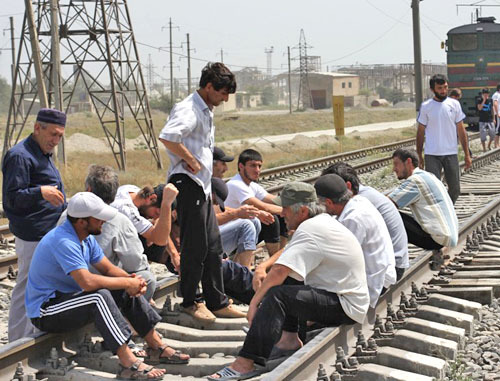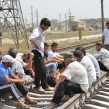
Dagestan’s Government Is Forced to Rely on Crude Force
Publication: Eurasia Daily Monitor Volume: 9 Issue: 151
By:

On August 5, a group of protesters blocked an international rail line in Dagestan for two hours. The railway links Russia with Azerbaijan and Dagestan’s capital, Makhachkala, with Moscow. The protesters were from the village of Komsomolskoye in northern Dagestan’s Kizilyurt district and were protesting the kidnapping of a villager, Adam Khairulaev, on August 3. Khairulaev’s relatives said they believed he had been kidnapped by government agents. They unblocked the railway after the police promised to clarify Khairulaev’s whereabouts the following day. The Kizilyurt district police chief, Askhabali Zairbekov, denied the local police’s involvement, saying that some other forces aiming to destabilize the district were behind the kidnapping. He said that Khairulaev was not particularly religious or suspicious and was summoned to the police station only once in the past two years. However, Khairulaev’s mother, Aishat Shadulaeva, told the Kavkazsky Uzel (Caucasian Knot) website that her son had been summoned by the police 12 times although he never was charged with anything (https://dagestan.kavkaz-uzel.ru/articles/210758/).
The police estimated that around 300 people took part in blocking the railway, while the protesters themselves said 2,000 people took part in the protest. The kidnapping victim’s relatives said that the police and the prosecutor general’s office at first refused to file an official search warrant for Khairulaev and accepted the relatives’ appeal only after they were faced with a large group of protesters. Still, the police took no steps to search for the abducted person, his relatives said (https://www.regnum.ru/news/kavkaz/dagestan/1558378.html).
On August 7, Dagestani Interior Minister Abdurashid Magomedov met with the Kizilyurt protesters. According to the imam of Komsomolskoye village, Dalgat Tazhudinov, the meeting was fruitful and Magomedov promised to look closer into alleged police abuses in the village. The interior minister reportedly expressed alarm over a rise in the number of abductions and said he did not know who was behind them (https://www.kavkaz-uzel.ru/articles/210812/).
Khairulaev’s kidnapping may have been an act of retaliation by the law enforcement agencies following the killing of a police Special Rapid Response Unit (aka SOBR) serviceman on August 1. The 37-year-old police officer, Magomed Ramazanov, was gunned down in the front yard of his home in Komsomolskoye, where the kidnapping took place two days later. Komsomolskoye village, along with Kizilyurt district as a whole, has the reputation of being an extremely violent part of Dagestan (https://www.regnum.ru/news/kavkaz/dagestan/accidents/1557671.html). An Internet user who commented on the news about Khairulaev’s kidnapping on the Kavkazsky Uzel website directly accused him of being behind the attack on Ramazanov. Although the person making the accusation wrote under a user name and cannot be positively identified, he used typical police jargon in his message (https://dagestan.kavkaz-uzel.ru/articles/210758/).
Despite multiple remarkable print reports from Dagestan, video recordings are indispensable in understanding the atmosphere in the republic. Kavkazsky Uzel posted a video of the Kizilyurt district protest. The video shows dozens of men shouting “Allahu Akbar!” (God Is Great!) and other Islamic slogans. When a woman flanked by other women starts to complain about the government having all the power, the protesters interrupt her with shouts, apparently disagreeing with her over the degree to which the government really has the power (https://www.youtube.com/watch?v=uqz-Ep9CiHg).
The video reflects how powerful Islamic ideology has become in Dagestan and how opposed Islam’s followers are to the authorities. Muslims in Dagestan do not hide their beliefs; instead, they come out into streets under Islamic slogans. Judging by the video, the Dagestani insurgency, which also strongly relies on Islamic ideology, has an extensive social base in the republic. This makes the police’s work especially hard, since the insurgents enjoy relatively broad – and in some areas probably overwhelming – support among the local population. Because the environment is so hostile and filled with human rights abuses, the police have poor intelligence, which in turn further alienates the civilians from the authorities. From this perspective, human rights abuses in Dagestan – and possibly in some other areas of the North Caucasus – reflect the government’s glaring weakness. If the government cannot rule the territory without reverting to egregious rights abuses for years, it testifies to systemic problems that are apparently hard to mend.
Another crime that appears to have been committed by police took place on August 1, when masked people in uniforms stopped a car on the highway in Dagestan’s Kumtorkala district and shot dead the 57-year-old driver. The victim was also a Kizilyurt district resident. Even though the identity of the assailants was not determined, the fact that they wore uniforms and masks and drove a car with no tags pointed to the involvement of government agencies (https://www.regnum.ru/news/kavkaz/dagestan/1557673.html).
Dagestan has experienced another spike in violence over the past several days. On August 2, two separate large-scale counter-terrorism operations were simultaneously carried out in the republic’s Buinaksk and Tsumada districts. Military and police forces that were dispatched to the republic from other regions of Russia participated in both special operations. A police officer was wounded during the counter-terrorism operation in Tsumada district while, according to government sources, one rebel was killed during the operation in Buinaksk district. Just a few hours later in the city of Buinaksk, an IED exploded under police officer’s car and killed him. So, given the deplorable results of these two counter-terrorism operations, in which a suspected rebel and a police officer died while another serviceman was injured, perhaps, it may be wiser for the police not to conduct such counter-terrorism operations at all (https://www.regnum.ru/news/kavkaz/dagestan/1558043.html).
Following the massive influx of the military and police forces from outside Dagestan into the republic, the security situation there appears to be deteriorating or, at best, not improving. Dispatching additional military forces to Dagestan without taking measures to increase the level of trust among the local population or introducing political reforms has proven so far to be a failure. To make up for the absence of reforms and broad public support for the government, the latter is reverting to crude force.




